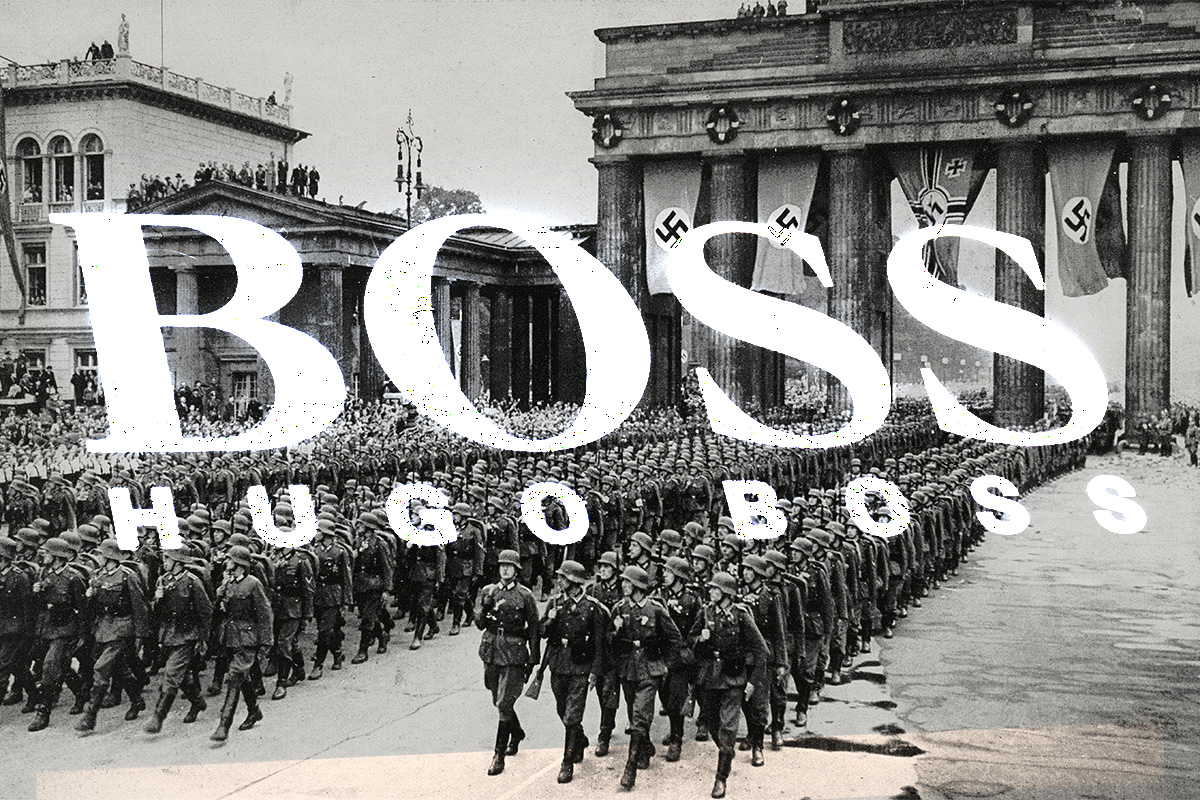Let’s face it: It’s tough to be a fashionable Jew. (Beyond the general difficulties of being a Jew, of course.)
Sure, there are plenty of Jewish fashion designers and brands to choose from — Rachel Antonoff, Zach Posen and Ralph Lauren to name a few. But there are some equally big names in the fashion industry which either have been at the center of antisemitic scandals or have antisemitic origins.
Here on Hey Alma, we’ve already covered that Coco Chanel was a Nazi informant and early 2000s brand Von Dutch was started by a man who admired the Third Reich. Over at our partner site Jewish Telegraphic Agency, they’ve covered Adidas, the Nazi-founded company which was recently in the news for hesitating to sever ties with Kanye West over his antisemitism.
So, while we’re on the topic of fashion brands with ties to antisemitism and the Nazis, let’s talk about Hugo Boss — the company which has been called “Hitler’s Tailor.”
Founded in 1924 by a tailor named (you guessed it) Hugo Boss, Hugo Boss AG began as a factory in Metzingen, Germany. The company produced shirts, jackets, work clothing, sportswear and raincoats. After a brief period of bankruptcy, Boss restarted the company in 1931 — coincidentally, the year he joined the Nazi Party.
Though it’s disputed when Hugo Boss started supplying the Nazis with uniforms, what’s clear is that the company was licensed through the Reichszeugmeisterei, or quartermaster’s officer of Nazi Germany, to supply uniforms in 1928. This gave the company the ability to supply uniforms to Nazi Party organizations like the Sturmabteilung (SA), Schutzstaffel (SS), Hitler Youth and National Socialist Motor Corps. By 1932, Hugo Boss was manufacturing the iconic black SS uniform, and in 1938, the company also began to manufacture Wehrmacht uniforms. Additionally, Hugo Boss AG utilized the work of approximately 140 forced laborers from Poland in its factories, as well as the labor of 40 French prisoners of war between October 1940 and April 1941.
According to research Roman Koester, Hugo Boss AG “profited demonstrably from National Socialism.”
After the war, Boss was penalized during the process of denazification in Germany. He was stripped of his voting rights, his ability to run a business and was slapped with a heavy fine, though Boss appealed that decision and was given a less severe punishment. During this period, Boss also tried to argue that he had only joined the Nazi Party and became a supplier of uniforms as a financial decision (which, uh, does not make it any better).
Years later, his son Siegfried Boss would tell Austrian news outlet Profil, “Of course my father belonged to the Nazi Party.” He added, “But who didn’t belong back then? The whole industry worked for the Nazi Army.” However, Koester wrote in his book “Hugo Boss, 1924-1945,” “It is clear that Hugo F Boss did not only join the party because it led to contracts for uniform production, but also because he was a follower of National Socialism.”
Hugo Boss died in 1948, but his company continued operation and pivoted to making men’s suits in 1954. Over the next 40 years, Hugo Boss AG developed into the luxury brand we know today; however, the company’s institutional knowledge of its own Nazi ties dissipated. (In 1991, Hugo Boss AG was bought by Italian firm Marzotto Textile Group and to this day, the brand is no longer associated with the Boss family.)
This all changed in 1997, however, when Hugo Boss AG was alerted to the fact that Hugo Boss’s name was on a list of dormant bank accounts released by Swiss bankers. The revelation that this bank account existed led Hugo Boss AG to discover Boss’s dealing with the Nazis.
“Right now we are trying to get a handle on the situation,” a spokeswoman for Boss, Monika Steilen, said at the time. “This is a very new theme for us. We have nothing in our archives.”
Following the discovery, the fashion brand funded the writing and publication of the book “Hugo Boss, 1924-1945,” which delineated Hugo Boss’s Nazi history. It was published in 2011, and at the time, Hugo Boss AG issued an apology saying it wished to “express its profound regret to those who suffered harm or hardship at the factory run by Hugo Ferdinand Boss under National Socialist rule.”
In spite of this troubling history, according to Reuters, Hugo Boss AG generated $3.17 billion worth of revenue in 2021.
So there you have it. I’m certainly not going to tell you what to do, but I’m going to stick with Jewish fashion brands like Susan Alexandra when it comes to adorning my Jewish self.



